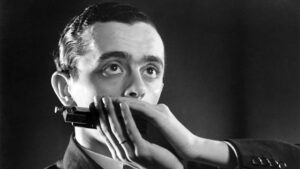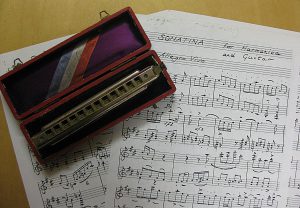Larry Adler and Anthony Burgess’s harmonica
‘I’d like to review Larry Adler’s autobiography, which comes out in November from Collins. Apparently the publishers already have proof copies ready. Would it be possible for me to have one of those and, if you’re willing, review the book?’ So wrote Anthony Burgess when submitting his review of Martin Amis’s Money to the Observer in September 1984. Burgess’s request was accepted and the Burgess Foundation’s library and archive contain both Burgess’s review copy of Adler’s autobiography, It Ain’t Necessarily So (1984), and his review, published in the Observer in November 1984. But why had Burgess made such a request?
Lawrence ‘Larry’ Cecil Adler was born in Baltimore in 1914. At the age of 14, he ran away to New York and there began his career as a professional musician, first playing minor roles in vaudeville. In 1931, Adler auditioned for Smiles, a Ziegfeld show which featured Marilyn Monroe and Fred and Adele Astaire and went on to win rave reviews for his performance of Ravel’s Bolero. Adler, now in great demand, toured nationally and internationally, entertaining troops during the 1939-45 war, and winning a number of film roles, both as a performer and as a writer of film scores. In 1953, he earned an Oscar nomination for his work on the score of Genevieve (1953), although his name was removed from the credits in America due to his unpopularity with Senator McCarthy and his supporters.

In his review of Adler’s autobiography, Burgess writes that he remembers Adler ‘speaking on the radio in 1951 and begging composers to take the instrument seriously’ and it was during the 1950s that several renowned composers, such as Ralph Vaughan Williams and Sir Malcolm Arnold, were to write works specifically for the harmonica and, indeed, for Adler personally. By the 1950s, Burgess owned a harmonica — a Super Chromonica Chromatic — which is part of the Burgess Foundation’s collection, thanks to a donation from John Beck. Burgess was friendly with John and his wife Barbara Beck in the 1950s, and although Burgess gave his harmonica to Barbara Beck in about 1951, the sound of the instrument stayed with him, and it features in at least two of his novels of the 1960s. In The Wanting Seed (1962) a harmonica is heard as soldiers await battle; and, in Tremor of Intent (1966), Theodorescu’s voice is described as ‘diluted to the reediness of a harmonica.’
Apart from his admiration for Adler, Burgess composed harmonica works for two other well known and highly skilled contemporaries: John Sebastian (1914-1980) and Tommy Reilly (1919-2000). Burgess met Sebastian in Rome in the early 1970s, and a close friendship developed. In You’ve Had Your Time (1990), Burgess recalls that Sebastian commissioned him to compose a sonata for harmonica and guitar, which he composed en route from Italy to New York by sea in 1972. He wrote two other compositions for Sebastian — ‘a bagatelle and a sonatina’, both of which seem to be lost.
Five years later, Burgess had an opportunity to meet Tommy Reilly. When he learned that he and Reilly would both be guests on BBC television’s Oscar Peterson Invites in March 1977, Burgess decided to compose a piece for harmonica and piano for them to perform together during the programme. Burgess completed his piece, called ‘Romanza’, in February 1977. ‘Now,’ Burgess wrote, ‘it only remained for me to compose for Larry the eagle and one of the minor patterns of my life would be fulfilled.”
It was not until November 1980 that Burgess met Adler at a cocktail party during the publicity tour for Earthly Powers, and he duly composed a ‘dissonant baroque suite’ for him. As far as Burgess knew, Adler never performed his composition, but relations between the two remained cordial. The Burgess Foundation’s archive contains a letter from Adler in which he writes that he would like to include some of Burgess’s pieces in a digital piano recital that he is planning, and Burgess himself remarked of Adler’s failure to perform his piece: ‘No matter: God has put me on earth to, among other things, write for the harmonica. The connection between that instrument and the kind of books I wrote was in doubt, but the three supreme players were somehow drawn to me as I to them. Something to do, perhaps, with my essentially vulgar psyche aspiring to high art, the sad suck-and-blow of the Somme elevated likewise.’ A copy of another piece that Burgess composed for the harmonica, ‘Sonatina for Harmonica and Guitar’, forms part of the Burgess Foundation’s collection, and is referred to in a selection of his essays on music, The Devil Prefers Mozart (2024).
Adler was to survive Burgess by eight years. In his later life, he had become a regular contributor to the Spectator, the New Statesman and the Oldie and was also a restaurant critic for Harpers and Queen. Adler remained, however, primarily a musician. In 1994, in celebration of his eightieth birthday, Adler and George Martin produced an album of George Gershwin songs, called The Glory of Gershwin, in which he collaborated with artists including Elton John, Sting, Kate Bush, Oleta Adams, and Cher. The album’s success made Adler the oldest artist to feature in the British music charts, entering at number two.
Works consulted for this post include: You’ve Had Your Time (1990); ‘Wandering through the Grove’ in Homage to Qwert Yuiop (1986); ‘Hand to Mouth’, Observer, 11 November 1984; A Clockwork Counterpoint: the Music and Literature of Anthony Burgess by Paul Phillips (2010).



